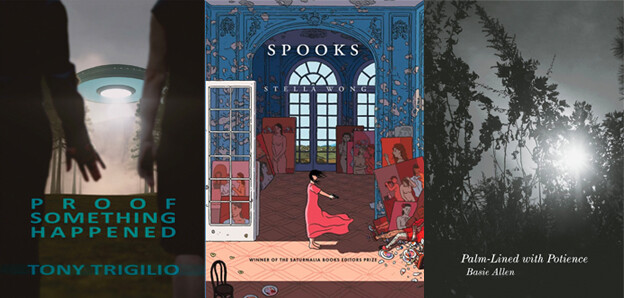
Aliens, Jesuses, bacteria
Kenna O'Rourke

Kenna O’Rourke reviews three poetry collections from the past two years: Proof Something Happened by Tony Trigilio, Spooks by Stella Wong, and Palm-Lined with Potience by Basie Allen.
Proof Something Happened, Tony Trigilio (Marsh Hawk Press, 2021)
Proof Something Happened deals in the skepticism, racism, gaslighting, and doubt surrounding the alien abduction story of Betty and Barney Hill. Now considered one of the earliest publicized alien encounter narratives, Betty and Barney’s recollections detail an “interrupted journey” as they drive through the deserted mountains of New Hampshire in September 1961. Trigilio’s text incorporates quotes from the Hills (including excerpts from Betty’s “Sightings Journal”), his personal ties to the Hills’ story, and snippets from late-night talk shows and Frank O’Hara; with each new clue, “We can tell what happened but this doesn’t mean we know more than when we started.” Perhaps most poignant in this collection are the meditations on race and grief, regardless of what one believes about UFOs. The reader sees how Barney, a Black man, and Betty, a White woman, are treated differently in the public eye, even by the doctor that hypnotizes them: “Barney might have certain anxieties on a trip away / from home because of his racial sensitivities.” When Barney dies suddenly, Betty immerses herself fully in their abduction narrative as shared memory: “I greeted it and said tonight was our 22nd anniversary — that I was the lone survivor.”
Spooks, Stella Wong (Saturnalia Books, 2022)
“Let’s be our own kings, / prom or drag,” exhorts Stella Wong in her debut collection. Undercover operations — “the plinky harp of counterintelligence” suggested by the title — manifest most in covert turns of phrase: “Don’t pause this movie yet. It’s getting good / at saying sorry for your loss.” But Wong’s explorations, however bound up in playful wordplay, are more confessional than close to the chest. The weight of the world can’t help but prick through the seeming nonchalance of deft linguistic maneuvering, showing up as race relations (“Where do you put your body / of color // Where do you put / your body of color”), medical mistrust (“You tell us how / your doctor trash-talks, frames you // as asexual and crazy and even worse, poor”), and domestic strife (“the therapist said / I’d need a disorder to keep talking // and insurance wouldn’t / count marital problems as one”). Pomelos, diluted soymilk, eyes, and stolen baby Jesus figurines populate this gripping text, asking or double-dog-daring: “Who’d rob God?”
Palm-Lined with Potience, Basie Allen (Ugly Duckling Presse, 2022)
Small round symbols and sweeping dotted lines appear throughout Basie Allen’s debut collection, tracing out palm readings or perhaps just guiding the eye to the poems’ juiciest inscrutable moments. Allen indicates that some pages should be torn out or flipped to be read fully, mirroring an activist’s disruption tactics: “I am not ashamed of inconvenience / and I promise to ruin everything,” he writes in one of several poems condemning NYC gentrifiers’ destruction of neighborhoods. Palm-Lined with Potience is rife with dirty details, from “five billion wide open mouths / unhing[ing] from hook bones // saying sweet things in the splinter / like baby I love you too” to the “5 million trillion trillion bacteria on earth / […] Which is the same number as 4 quadrillion quadrillion.” Some of these details and “fun” facts feel crucial to a pleasurable poetic grime (“I want to eat only the richest dirt / and bathe in vats of mud”); others serve to illuminate, through contrast, the deep love and feeling the author has for his city, his people, and his poetry: “‘The Facts’ // Know nothing / About what it means / To dance or smell like shit / In a basement with no money / But your best friends / And the ecstasy comes from the comfort and joy of being / Close to your people but the feeling of ecstasy also comes from the / ecstasy we took.”